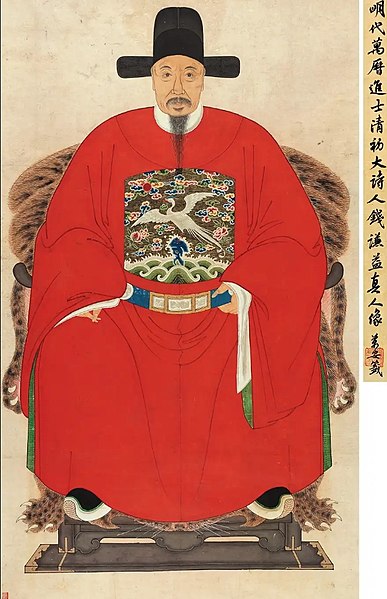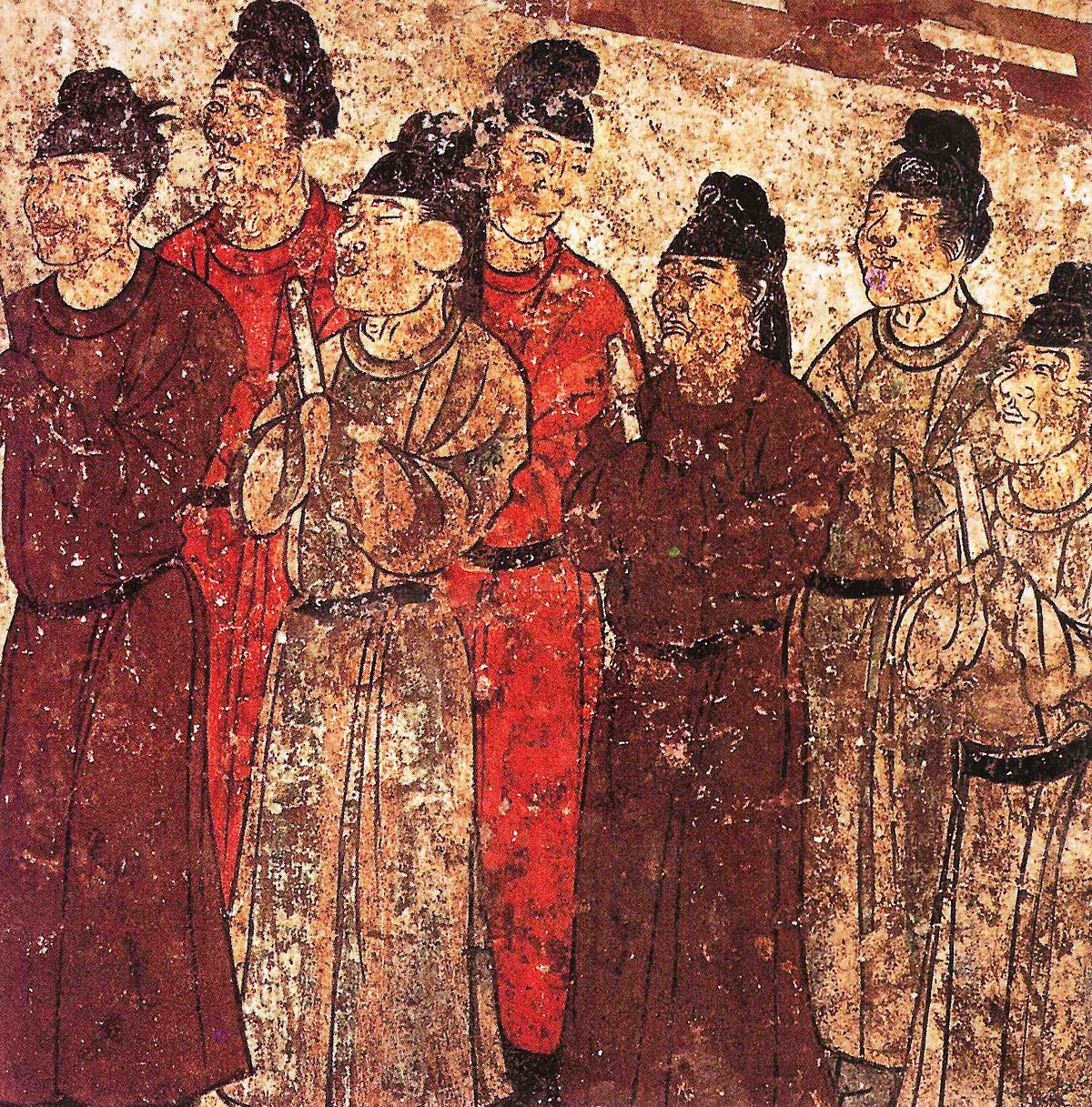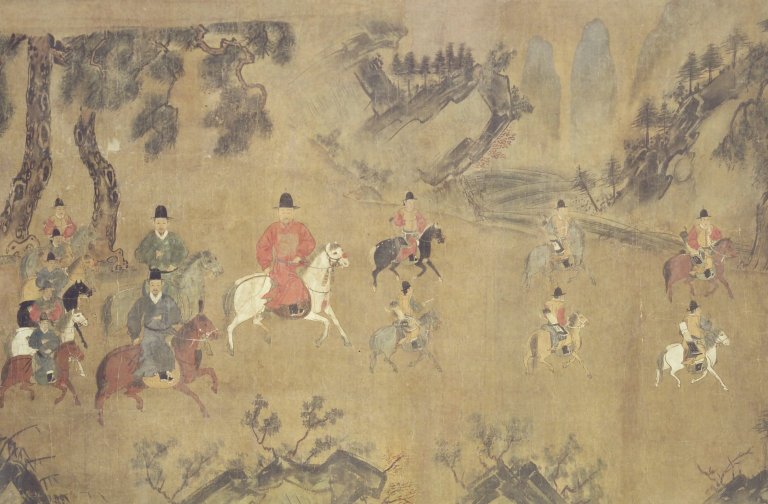1638

Qian Qianyi (circa 1638)
The Descent Upon Nagasaki sends ripples through the imperial court. On the one hand, Admiral Zheng’s partisans have been riding the high for months. The Admiral is rapturously popular among his followers in Dongshan, obviously, and the city of Luoyang enters a bit of an economic boom, fueled by foreign trade and foreign “trade” (they’re smart enough not to pillage the Spanish or Portuguese, but the Dutch? or anyone else who looks shifty? at this point, that’s fair game).
Less impressed are some of the more somber members of the bureaucracy. Zhou Qiyuan patiently writes another memorial to the throne, explaining how foreign adventurism may have unintentional consequences. His message is read to the emperor and politely received. Some more junior officials also try their hands at writing criticisms of Admiral Zheng, with mixed results. One particularly infamous memorial is couched so abusively that its author is flogged and fined a month’s salary.
In other news, Sun Chengzong is feeling like it’s high time he retired as Grand Secretary. He’d held onto the post for years beyond when he could’ve stepped down, out of respect for the emperor, but he’s now in his seventies, and keeping the bureaucracy in order is a job for a more vigorous man. He applies for, and receives, permission to return to his hometown of Gaoyang, where he intends to live out his remaining days in peace (although he’s open to consulting unofficially on policy topics).[1]
He is replaced as Grand Secretary by Qian Qianyi, who up until now had been serving as Minister of Rites. Qian’s former post is filled by Kong Zhenyun (孔貞運), an immensely distinguished scholar (he was assessed second nationally out of all jinshi candidates in the forty-seventh year of the Wanli era, which is to say 1619). Minister Kong is also a direct agnatic descendant of Confucius, albeit by a junior line.[2]
Many students, when reading about this era, wonder why Admiral Zheng Zhilong did not attempt more long-term actions like invading Japan itself, going toe-to-toe with the shogun, et cetera. The simplest answer is: that sounds like a lot of work for questionable profit. Raiding Dutch merchant ships was more fun, anyhow. That doesn’t mean that he and his supporters are averse to playing a part in the bloodshed now breaking out in Japan. In the Shimabara domain, the mostly-Christian uprising is eventually suppressed by government forces during the early summer. Occasional resupply runs from Zheng-affiliated captains had allowed the rebels to hold out in several strongholds, and eventually a large portion of the rebels are successfully evacuated by sea. Among those transported from Japan to Dongshan is Amakusa Shirō, a.k.a. Geronimo, the charismatic youth who had led the rebellion. His followers think he can work miracles. The religious makeup of Dongshan is only getting more cosmopolitan by the day.
On their way home, Zheng’s fleet pays a visit to the Ryukyu Kingdom, where the officials, after some prompting, reaffirm their submission to the Great Ming and disclaim any and all loyalty to other sovereigns (particularly to the Japanese). Shō Hō, who has now reigned as king for almost two decades, is not entirely opposed to the move, even if it is negotiated practically at gunpoint; he’s been pushing for more tribute missions with China (an important source of trade for any imperial tributary), and Zheng’s merchant empire looks like a useful partner to have.[3]
Tokugawa Iemitsu is practically seething. Not so much about the Ryukyu thing -- the Ryukyuans paid tribute to the Satsuma daimyos, not to the shogun, and quite frankly he’s got bigger issues than Shimazu Tadatsune (appointed daimyo of the Satsuma domain by Iemitsu’s grandfather) getting a bloody nose. (As it turns out, Tadatsune soon dies and is succeeded by his son Mitsuhisa.) The Shimazu clan are technically loyal, more loyal than some of the crypto-Catholics on Kyushu, but they hold significant power, and right now, the shogun is convinced that his agents need to really bear down hard on any potential sources of dissent. Don’t want another rebellion like the one in Shimabara, which was pretty bad. Don’t want any of the other daimyos getting ideas. Needless to say, his opinions on foreigners, Christians, and traitors are quite negative.
In the Tianqi court, there are celebrations over the birth of Princess Yining. The Emperor now has two surviving sons and one daughter. Daughters obviously are not particularly useful for inheritance purposes, but that’s fine. Nicolas Trigault writes approvingly that the princess is a healthy babe, so far as the medical practitioners can tell, is somewhat quiet but has a clear spark of intelligence in her eyes. Did we mention she’s a newborn infant? Obviously, this is just the Jesuit’s rose-tinted view of the emperor shining through. Still, in this he’s more than a little bit prescient.
The Tianqi Emperor issues a proclamation concerning the creation of eunuchs. A large part of it may have been ghostwritten: the officially published text goes into detail about the Hongwu Emperor and his condemnation of castration and other foreign innovations introduced by the Yuan. The wise patriarch of the dynasty had insisted on standardizing the penal system and had drafted a legal code to guide the people. There was even a section prohibiting people from adopting children from other families and making them eunuchs. Well, it obviously wasn’t enough! From now on, the Tianqi Emperor declares, all castration of children is to be prohibited, and the punishment for doing so increased. Parents who are unable to feed their children are not to send them to Beijing in the hopes they will become an imperial eunuch; the palaces, after all, have scaled down such usage over the past decade and are not presently accepting more. As alternatives, the emperor suggests military service or construction projects to be imminently announced, for those youths unable or unwilling to sit the civil service exams. Minister Dong Kewei is directed to see how the Ministry of Works would be best able to use the manpower.
The plague, which has been killing peasants in Shanxi for quite some time, is now being reported consistently in the villages of Hebei. Travel to some of the worst-affected areas is being restricted, and locals hurry to buy anti-plague remedies of dubious efficacy. The imperial court hosts ceremonies invoking heaven’s power to turn back the plague; only time will tell if heaven responds.
Footnotes
[1] IOTL by 1638 Sun Chengzong had already retired from national politics. In that year, he led his family and personal retainers in a last stand against a Qing military incursion, during which he perished.
[2] He was a real person who existed. The fact that he’s a descendant of Kongzi isn’t really relevant but I thought it was cool.
[3] Shō Hō was previously mentioned in the 1628 update.


